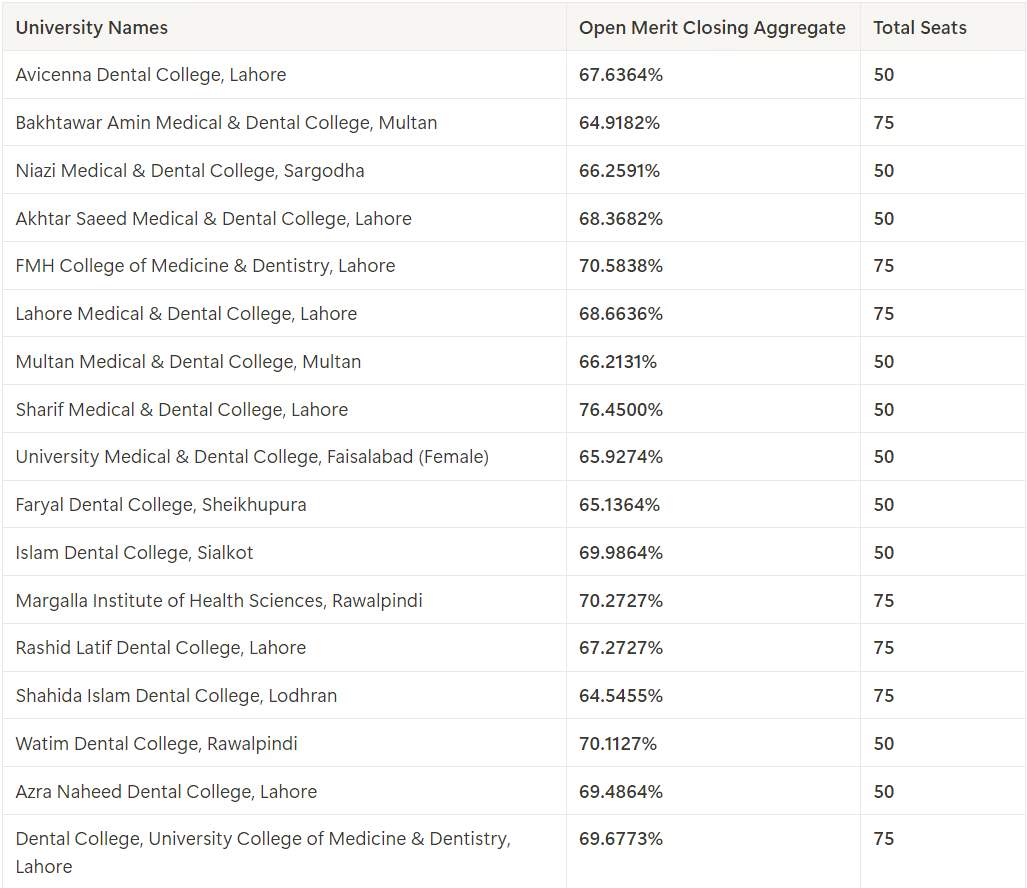
MDCAT Bravo Batch 2026
Early Admissions Open!
Kick off your MDCAT prep with daily live classes starting from 5th January! Cover the entire syllabus, attempt weekly tests and get counselling from expert teachers like Dr. Akbar

Early Admissions Open!
Kick off your MDCAT prep with daily live classes starting from 5th January! Cover the entire syllabus, attempt weekly tests and get counselling from expert teachers like Dr. Akbar

Admissions are open!
Enjoy daily live classes and recorded lectures with EDGE Learning mentors – Sir Ahmer, Sir Saad & Miss Maryam exclusively on the Maqsad app.

Want to ace the ECAT exam?
Join Maqsad’s ECAT batch, designed for high-scoring students aiming for UET, NUST, GIKI & more. With live classes, MCQs and more, secure your seat in UET Round 1 + NET Round 2 + IBA CS R1 + others!
The University of Health Sciences (UHS) Lahore serves as the central admitting university for medical and dental institutions across Punjab, overseeing admissions for MBBS and BDS programs in both public and private colleges. Punjab has some of the best medical and dental colleges in Pakistan, which play a key role in training doctors and dentists. These colleges are recognized by the Pakistan Medical and Dental Council (PMDC) and follow a curriculum that meets both local and international standards, ensuring students receive quality education.
Admission to these medical colleges in Punjab is very competitive. It is mainly based on MDCAT 2024 scores and FSc pre-medical results or equivalent qualifications.
With the PMDC MDCAT 2024 results now available, UHS has opened admissions for both public and private medical colleges in Punjab. UHS has also launched an online application portal to make the process easier for students. This blog will help you calculate your MBBS/BDS aggregate score and check if you meet the admission criteria for different colleges in Punjab.
How to get admission into an MBBS Program after MDCAT Result? The first thing to do once you have your MDCAT result is to calculate your MDCAT aggregate score. Seats in public medical and dental colleges are secured on the basis of students’ aggregate scores. You can calculate your aggregate score using this formula:

You can use this MDCAT aggregate calculator to easily calculate your MDCAT merit score.
Below is a list of all public medical colleges in Punjab, along with their closing aggregates for open merits and total seats in 2023. Compare your MDCAT aggregate to these figures to gauge your chances of making it to this year's merit list.

Public Dental Colleges (BDS):
Below is a list of all public dental colleges in Punjab, along with their 2023 closing aggregates for open merit and total seats. Compare your MDCAT aggregate to these figures to gauge your chances of making this year's merit list.

Below is a list of all private medical colleges in Punjab, along with their closing aggregates for open merits and total seats in 2023. Compare your MDCAT aggregate to these figures to gauge your chances of making it to this year's merit list.


Below is a list of all private dental colleges in Punjab, along with their 2023 closing aggregates for open merit and total seats. Compare your MDCAT aggregate to these figures to gauge your chances of making this year's merit list.



If you're unsure about your merit list and aggregate, feel free to reach out to our counselors on WhatsApp for personalized guidance. Additionally, try using our university admission chance calculator, which evaluates your merit and closing scores to help you determine your likelihood of admission and which universities you might be eligible for.
You can also check the MDCAT UHS Merit List yourself.
Your MDCAT score plays a pivotal role in determining your chances of securing admission to UHS-affiliated medical and dental colleges. However, several factors influence this outcome beyond just academic preparation. One critical aspect is your performance in the FSc pre-medical (or equivalent) examinations, as these grades are combined with your MDCAT score to calculate the aggregate. Additionally, the overall merit trend in your admission year significantly impacts your chances. For instance, if the majority of candidates score exceptionally high in MDCAT, the closing aggregates for colleges may rise, making it more competitive to secure a seat. Another influential factor is quota-based admissions, which allocate seats for specific districts, underprivileged regions, and special categories, such as overseas Pakistanis. These quotas can either work in your favor or increase competition for open-merit seats.
Apart from academic factors, logistical elements such as timely submission of MDCAT application documents and adherence to admission deadlines are crucial. Many deserving students miss out on opportunities due to incomplete applications or delayed submissions. Lastly, the choice of colleges listed on your application matters; applying strategically to a mix of high-ranking and mid-tier colleges can improve your chances of getting accepted. Remember, each application cycle is unique, and understanding the dynamics of your year can give you a competitive edge.
If you’ve already attempted MDCAT and are considering retaking MDCAT to improve your aggregate, it’s essential to focus on targeted preparation. Start by identifying your weak areas in subjects like Biology, Chemistry, Physics, or English by analyzing past papers and practice tests. Once you pinpoint your weaknesses, dedicate extra time to those topics using concise yet comprehensive MDCAT resources, such as Maqsad’s video lectures and notes. Improving your conceptual clarity is vital, especially in Physics and Chemistry, where formula-based problem-solving is common. Supplement your learning with timed practice sessions, as speed and accuracy are key to scoring higher.
In addition to academic preparation, stress management and mental conditioning play an important role in boosting your performance. Incorporate regular breaks, mindfulness techniques, and exercise into your routine to reduce burnout. If time allows, take full-length mock exams under exam-like conditions to improve your stamina and familiarize yourself with the pressure of the real MDCAT. Finally, stay updated on the latest syllabus and exam pattern issued by PMDC to ensure your preparation is aligned with current standards. Even small improvements in your preparation strategy can significantly impact your overall score and enhance your admission prospects.
Securing a spot in UHS-affiliated medical colleges requires a strategic approach to MDCAT preparation. Start by creating a realistic study plan that covers all subjects thoroughly while leaving enough time for revision. Prioritize high-yield topics such as human physiology in Biology, reaction mechanisms in Chemistry, and mechanics in Physics, as these areas tend to have higher weightage in the exam. Active learning techniques, such as summarizing key concepts, making flashcards, and solving MCQs daily, can help reinforce your understanding. Don’t forget to review the PMDC syllabus regularly to avoid studying irrelevant material.
Another crucial strategy is to practice solving past papers and sample tests. This not only familiarizes you with the exam format but also helps you gauge the type of questions commonly asked. Aim to complete at least 5–10 full-length mock tests, analyzing your mistakes after each attempt to refine your strategy. This will also help you assess your time management skills during the MDCAT Exam. Seek guidance from experienced teachers, or consider joining online preparatory platforms like Maqsad for structured courses and personalized feedback. Lastly, focus on maintaining a balanced routine, including proper sleep and nutrition, to stay physically and mentally fit. By following these strategies, you can maximize your potential and increase your chances of making it to UHS.
Yes, the MDCAT 2024 results have been announced by the University of Health Sciences (UHS) Lahore. Over 90% of candidates successfully passed the exam. View UHS result details and answer key here.
To gain admission to UHS-affiliated public medical colleges, candidates typically require an aggregate of around 90% or higher.
Zainab Munir, daughter of Munir Ahmad Qadir, from Lahore, emerged as one of the top scorers, achieving an outstanding 99.5% result.
UHS is a government university under the Punjab Provincial Government with autonomous management by a board of professionals.
The provisional merit list for UHS admissions can be accessed on the official UHS website once it is released. This list includes college-wise aggregates and helps students gauge their chances of admission.
You can calculate your MDCAT aggregate using the official PMDC formula, which incorporates your MDCAT score, FSc (Pre-Medical) marks, and matriculation marks. Use Maqsad's MDCAT Aggregate Calculator for quick and accurate calculations.
After the provisional merit list is released, students are required to confirm their college preferences. UHS will finalize admissions based on the revised preferences and seat allocations
UHS is a government or public university under the Punjab Provincial Government with autonomous management by a board of professionals.
Nearly 56,000 candidates appeared in UHS MDCAT 2024, aiming to secure admissions in 19 public and 49 private medical and dental colleges across Punjab. These students competed for approximately 8,500 seats, reflecting the intense competition for medical education in the province.
